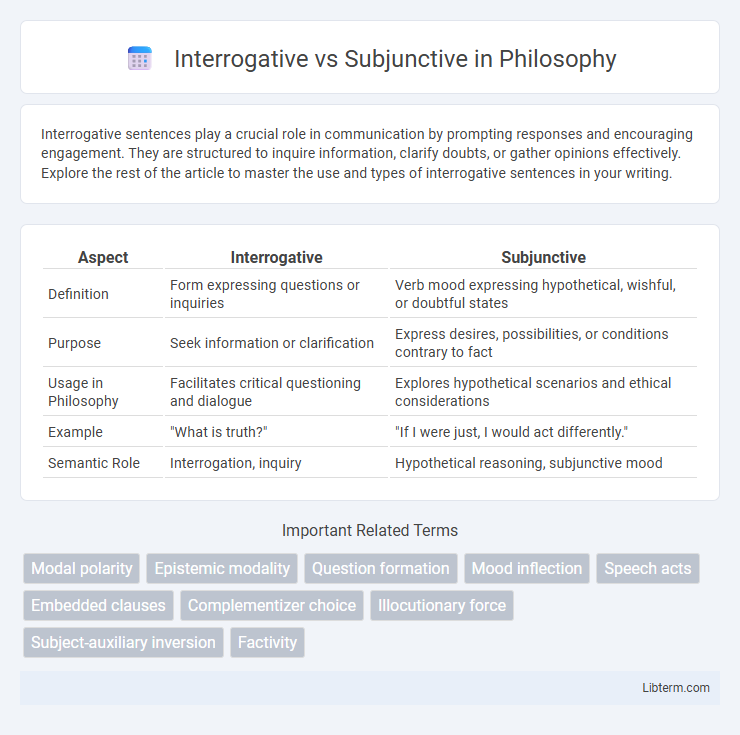Interrogative sentences play a crucial role in communication by prompting responses and encouraging engagement. They are structured to inquire information, clarify doubts, or gather opinions effectively. Explore the rest of the article to master the use and types of interrogative sentences in your writing.
Table of Comparison
| Aspect | Interrogative | Subjunctive |
|---|---|---|
| Definition | Form expressing questions or inquiries | Verb mood expressing hypothetical, wishful, or doubtful states |
| Purpose | Seek information or clarification | Express desires, possibilities, or conditions contrary to fact |
| Usage in Philosophy | Facilitates critical questioning and dialogue | Explores hypothetical scenarios and ethical considerations |
| Example | "What is truth?" | "If I were just, I would act differently." |
| Semantic Role | Interrogation, inquiry | Hypothetical reasoning, subjunctive mood |
Introduction to Interrogative and Subjunctive
Interrogative sentences are structured to ask questions, using auxiliary verbs and inversion to elicit information. Subjunctive mood expresses wishes, hypotheticals, or demands, often signaled by specific verb forms and dependent clauses. Understanding the distinction between interrogative structures and subjunctive moods is essential for precise communication and grammatical accuracy.
Defining the Interrogative Mood
The interrogative mood is a grammatical form used to ask questions, typically characterized by subject-verb inversion or the use of interrogative words such as who, what, where, when, why, and how. It contrasts with the subjunctive mood, which expresses wishes, hypotheticals, or conditions contrary to fact. Understanding the interrogative mood is crucial for identifying direct and indirect questions in English syntax.
Understanding the Subjunctive Mood
The subjunctive mood expresses wishes, hypotheticals, or demands, differing from the interrogative mood, which forms questions to seek information. Mastery of the subjunctive requires recognizing its use in clauses following verbs like "suggest," "recommend," or expressions of necessity, such as "It is essential that." Understanding subjunctive forms, especially in verbs like "be" and "have," enhances clarity and precision in complex sentence structures.
Key Differences Between Interrogative and Subjunctive
Interrogative sentences are structured to ask questions, characterized by inversion of the subject and auxiliary verb, and often end with a question mark. The subjunctive mood expresses wishes, hypothetical situations, demands, or suggestions, using specific verb forms such as "were" instead of "was" in conditional clauses. Key differences include interrogatives focusing on inquiry and requiring responses, while subjunctives convey unreal or desired states without expecting direct answers.
Common Uses of the Interrogative Mood
The interrogative mood is primarily used to form questions that seek information, clarification, or confirmation, often appearing in direct and indirect question formats. It typically involves subject-auxiliary inversion or the use of interrogative words such as who, what, where, when, why, and how. Unlike the subjunctive mood, which expresses wishes, hypotheticals, or demands, the interrogative mood is centered on eliciting responses and gathering factual data.
Typical Uses of the Subjunctive Mood
The subjunctive mood typically expresses wishes, hypotheticals, demands, or suggestions, often triggered by verbs like "recommend," "insist," or "wish." It appears in clauses following expressions such as "if I were" or "it is essential that," highlighting states contrary to fact or desired outcomes. Unlike the interrogative mood, which forms questions, the subjunctive centers on potential or non-real scenarios without seeking information.
Grammatical Structures: Interrogative vs Subjunctive
Interrogative sentences structure typically involves auxiliary verbs or subject-verb inversion to form questions, such as "Are you coming?" whereas subjunctive mood employs base verb forms to express wishes, hypotheticals, or demands, like "If I were king." Interrogative forms prioritize clarity in seeking information, using question words (who, what, where) alongside modal auxiliaries, while subjunctive structures often omit tense markers and rely on specific verb forms for hypothetical or non-real scenarios. The distinction in grammatical patterns highlights interrogatives' function in querying and subjunctives' role in expressing uncertainty or desires.
Examples in English Sentences
Interrogative sentences ask questions, often beginning with words like "what," "where," "who," or auxiliary verbs such as "do" or "can," for example, "Where are you going?" or "Can she help?" Subjunctive sentences express wishes, hypothetical situations, demands, or suggestions, using verbs in their base form, as in "If I were taller, I would play basketball" or "It is essential that he be present." Distinguishing these moods in English improves clarity in communication and grammatical accuracy.
Common Mistakes and Misunderstandings
Interrogative sentences often confuse learners who mistakenly apply subjunctive verb forms, leading to incorrect question structures such as "Were he coming?" instead of the proper "Is he coming?" Subjunctive mood mistakes frequently arise when speakers use indicative forms in hypothetical or wishful contexts, for example, "If he was here" instead of the correct "If he were here." Understanding the distinct functions--interrogatives for direct questioning and subjunctives for expressing wishes, doubts, or hypotheticals--prevents common errors that blur grammatical clarity.
Practical Tips for Mastery
Mastering the interrogative and subjunctive moods involves recognizing their distinct functions: interrogatives form questions seeking information, while subjunctives express wishes, hypotheticals, or demands. Practice forming questions by varying word order, using auxiliary verbs like "do" or modal verbs such as "can" and "will," and for subjunctives, focus on structures like "If I were" or "It is essential that." Regular exposure to examples in context, targeted exercises, and self-correction through speaking and writing enhance practical command over these moods.
Interrogative Infographic

 libterm.com
libterm.com